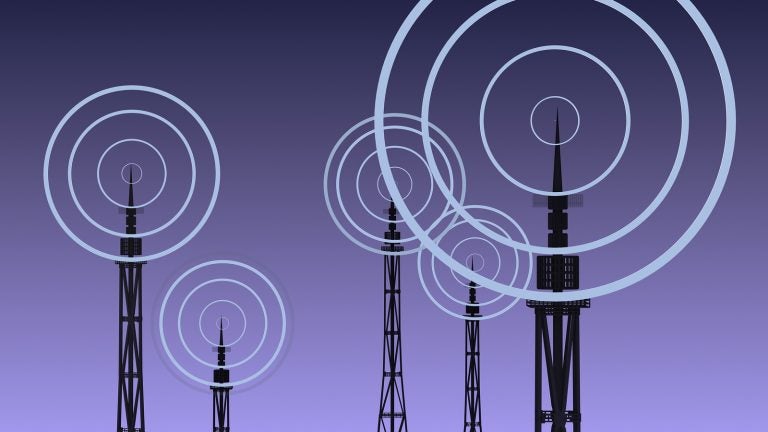NJ lawmakers told to temper expectations in FCC broadcast spectrum auction
Listen
radio signal
While the federal government is moving forward with the next phase of a planned nationwide auction of broadcast airwaves, New Jersey’s acting treasurer is warning lawmakers anxious for a windfall from a sale of broadcast spectrum controlled by the state’s publicly owned television stations to keep their expectations in check.
The auction comes as the federal government is attempting to free up broadcast airwaves currently being used by TV stations in favor of wireless providers who are trying to meet an increasing consumer demand for streaming video and other content that’s viewable over wireless broadband.
Recent estimates from federal analysts determined that airwaves controlled by New Jersey’s four state-owned stations could be worth a combined $2.3 billion, and interest in the auction among New Jersey lawmakers has been running high as they look for ways to help solve the state’s biggest financial problems.
But during a round of budget committee hearings held in the State House last week, acting Treasurer Ford Scudder gave lawmakers several reasons to expect more modest results from the auction scheduled to get underway at the end of the month. They include the complicated structure of the Federal Communications Commission’s multistep auction and state law that will restrict New Jersey from selling the airwaves of all four of its stations during the auction.
Lawmakers have started wondering what would be the best way to use auction proceeds like paying down the state’s pension debt or reinvestment in public media as many have begun to call on the state to do. But Scudder cautioned against talking too seriously at this stage about how the state may decide to allocate any proceeds
That’s because any revenue could take more than a year to collect, and there still remains a chance that New Jersey could ultimately come away with nothing.
“There’s a long timeline on this auction, and it’s a very complex auction that the FCC has never attempted previously in its form and structure, so there’s no guarantee that the auction will actually proceed successfully,” Scudder said while making his first public comments to lawmakers.
The auction process is extremely complicated and is playing out in several stages, with the first scheduled to begin at the end of this month. The auction will start with TV station owners who have offered to put up for sale some or even all of the broadcast spectrum they control. Then, once a certain amount of spectrum is obtained, the airwaves will be resold to wireless providers in the next phase of the auction.
The FCC last month announced that there was enough interest in the auction among station owners to go forward with the first phase, which begins on May 31.
“The broadcasters have stepped up and done their part to fulfill that demand,” said Tom Wheeler, the agency’s chairman. “I look forward to a robustly competitive auction and the vast economic and consumer benefits that await.”
New Jersey has for decades owned four public television stations in the highly desirable broadcast market sandwiched between New York and Philadelphia: WNJN in Montclair, WNJB in New Brunswick, WNJT in Trenton, and WNJS in Camden. Those stations are currently used to provide public-television programming by NJTV under a five-year deal with the nonprofit Public Media NJ, an affiliate of WNET, New York City’s flagship public TV station.
After the federal government announced last year that it would be conducting the auction, the New Jersey Public Broadcasting Authority decided to explore entering the sale to see if it could generate a windfall without significantly affecting programming since many viewers now get their NJTV shows via cable or online. The broadcasting authority announced in January that it would be participating in the auction, but state officials have said very little since, citing strict anti-collusion rules associated with the auction process.
Scudder, while appearing before lawmakers in both the Assembly and Senate last week, gave lawmakers a fuller explanation of how the auction will play out and why it offers the state no guarantees despite the lofty estimates that have been set by the federal analysts.
First off, he said the initial phase of the auction features a “reverse” format that will pit station owners against each other throughout a bid process that’s designed to lower prices ultimately paid to owners.
In a traditional auction, the purchase price is bid upward in a competition between potential buyers to see who is willing to pay the owner the most for the item on the auction block. But in a reverse auction, the process starts with the maximum bid price, and it’s the owners who are then pitted against each other during subsequent rounds. The format forces most owners to choose between selling at a reduced price or not selling at all.
New Jersey law also prevents the state from selling all four of its broadcasting licenses, Scudder said, and state broadcasting officials have also said they have no plans to get out of the public-television business, putting a $2 billion windfall even further out of reach.
“The numbers that are in the press are likely much higher than what we would receive,” Scudder said.
And Scudder said the auction could also come to an end with none of the New Jersey-owned stations being sold.
“As the auction proceeds, we’ll be looking at what the price is and whether we’d be willing to sell those assets at that price,” he said.
Still, given the location of the state-owned stations in what’s considered to be the most valuable broadcasting region in the country, many analysts believe a sale of some sort is likely. The broadcasting authority also has a number of options that could generate revenue that wouldn’t involve an outright sale, including moving to a less-powerful frequency or entering into a channel-sharing arrangement with other broadcasters.
The auction is also coming at a time when New Jersey is facing several significant financial challenges that need attention. They include a public-employee pension system that is deep in debt and a transportation infrastructure fund that is close to going broke, problems that have increased the eagerness among lawmakers for a sale.
Senate Budget and Appropriations Committee Chairman Paul Sarlo (D-Bergen) asked Scudder to explain how Treasury is planning to spend any revenues that could be generated from the auction once it’s completed, and he specifically raised the possibility that proceeds could be used to help retire pension debt.
But Scudder said it was too soon in the process to start seriously planning how to spend money that could be raised from the auction.
“I think there will be lots of options on the table — I don’t want to engage in hypotheticals,” Scudder said.
He also said it could be months before the state will find out if any of its assets were purchased during the initial stage of auction. And since the next step of the auction process will involve the selling of the freed-up airwaves to wireless providers, it could be well over a year before the state would actually see any revenues.
“It’s tough to engage in hypotheticals when we have no idea whether we’re going to sell assets and, if so, what amount of money those are going to bring in” Scudder said.
During an Assembly hearing, the acting treasurer was asked by Assemblyman Gordon Johnson (D-Bergen) if at least some of the proceeds should be reinvested in public media to ensure the state’s electorate continues to be well-informed.
“It’s still far too early to know whether the auction will succeed. In the event that it does, that would certainly be one of the things we would look at,” Scudder said.
________________________________________________________
NJ Spotlight, an independent online news service on issues critical to New Jersey, makes its in-depth reporting available to NewsWorks.
WHYY is your source for fact-based, in-depth journalism and information. As a nonprofit organization, we rely on financial support from readers like you. Please give today.




